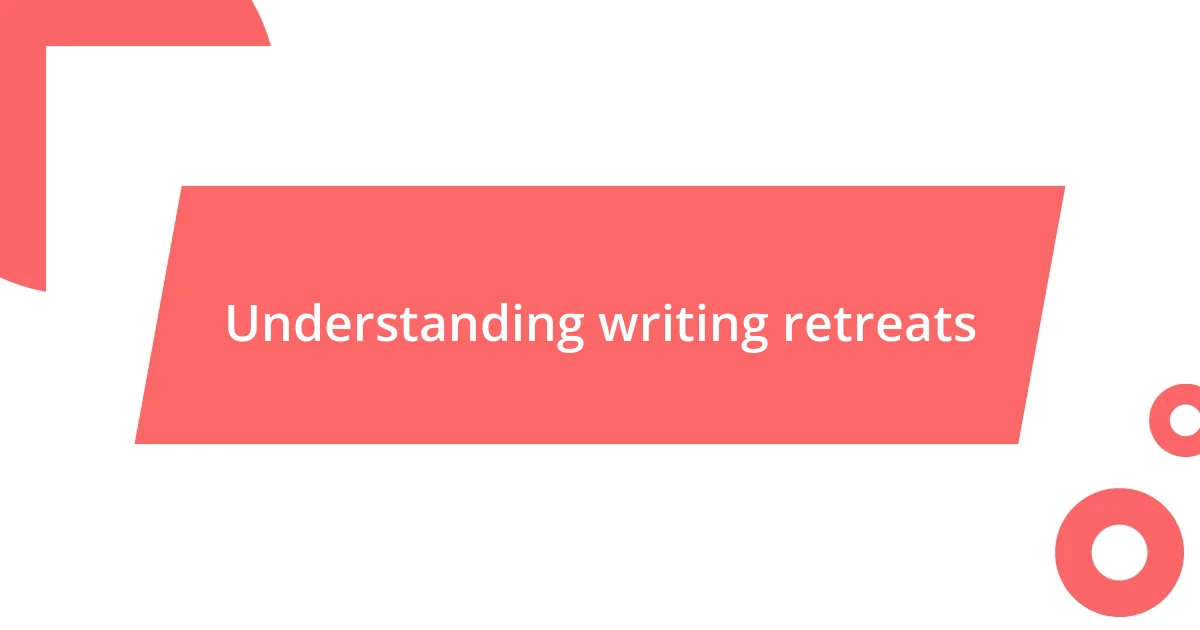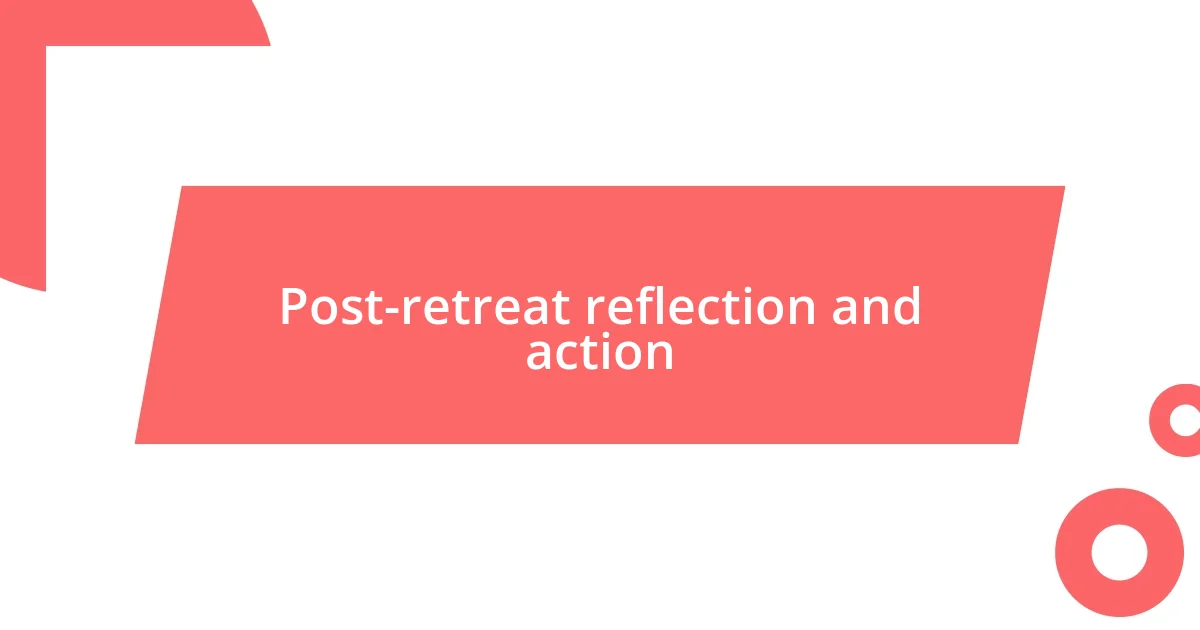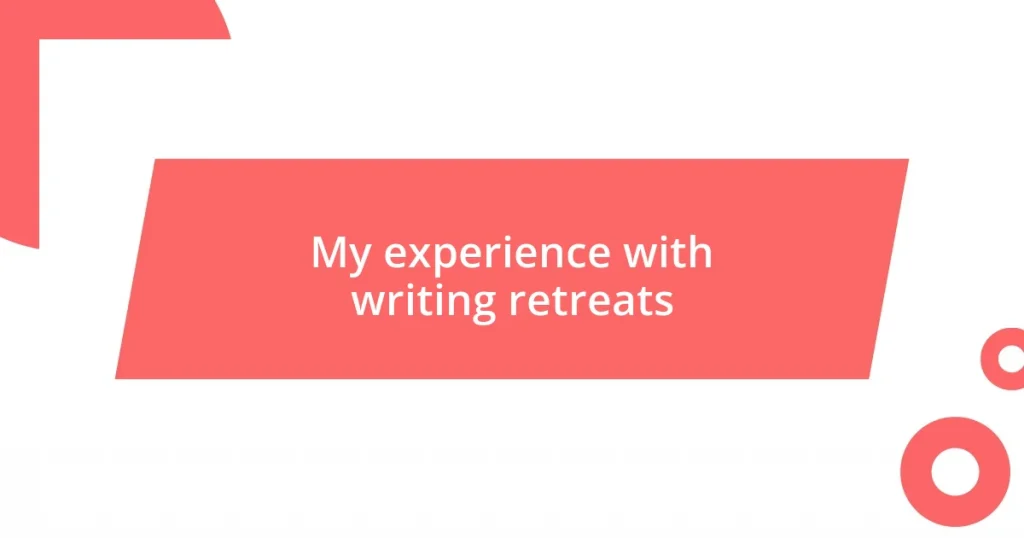Key takeaways:
- Writing retreats offer a distraction-free environment that enhances creativity and allows for both solitary reflection and community engagement among writers.
- Choosing the right retreat involves considering the focus of writing, location, and size, all of which can significantly impact your experience and inspiration.
- Post-retreat reflection and maintaining connections with fellow participants are essential for sustaining creativity and integrating new insights into daily writing practices.

Understanding writing retreats
Writing retreats are unique spaces designed for authors to immerse themselves in their craft away from daily distractions. I’ll never forget my first retreat; it felt like stepping into a cocoon of creativity. Surrounded by fellow writers, we shared our struggles, triumphs, and that exhilarating feeling of a blank page finally transforming into something beautiful.
The atmosphere of a writing retreat can significantly influence your productivity and mindset. I remember moments of sheer joy when ideas flowed effortlessly, inspired by the serene environment. Have you ever felt the urge to write but struggled against the noise of ordinary life? Writing retreats offer a solution, providing a focused sanctuary where your only task is to create.
As you delve into a writing retreat, it’s essential to consider what you hope to gain from the experience. Are you seeking solitude to refine your craft or community to share your journey? During one retreat, I realized that my growth as a writer flourished not just through solitude but also through conversation and encouragement with others. The blend of personal reflection and collaborative spirit can truly elevate your writing.

Choosing the right retreat
Choosing a retreat that aligns with your goals is crucial for getting the most out of your experience. I remember choosing a retreat focused on non-fiction writing, thinking it was the perfect fit for my latest project. However, I quickly realized that I missed the dynamic workshops of poetry, where I could explore language and emotion more freely. Always consider not just the type of writing involved, but also the focus of the activities being offered.
Another important aspect to ponder is the location. Do you prefer a lakeside retreat to feel refreshed and inspired by nature, or a cozy cabin in the mountains for introspection? I once attended a retreat nestled in the hills, where each day began with a sunrise hike. Those early morning moments, surrounded by breathtaking views, ignited my creativity in ways I hadn’t anticipated. The setting proved to be just as important as the writing itself.
Finally, look into the size and structure of the retreat. A smaller, more intimate gathering can foster deep connections and personalized feedback, while a larger retreat might offer diverse insights and perspectives. I’ve participated in both types, and each provided its unique flavor of inspiration. Weaving through various interactions has often sparked ideas I never would have uncovered alone.
| Factor | Considerations |
|---|---|
| Focus of Writing | Specific genres or themes can shape your experience. |
| Location | A picturesque or calming environment can boost creativity. |
| Size of Retreat | Intimacy versus diversity; what fosters your best work? |

Preparing for your retreat
Preparing for a writing retreat can feel both exciting and a bit overwhelming. When I first attended a retreat, I realized that taking time to set intentions significantly enhanced my experience. Writing down specific goals, like finishing a chapter or exploring a new style, provided me with a clear focus that drove my creativity.
Here are some practical steps to consider as you get ready:
- Pack Wisely: Bring your preferred writing tools, cozy clothes, and any personal items that inspire you.
- Set Goals: Outline what you want to accomplish during the retreat, whether it’s completing a draft or seeking feedback.
- Minimize Distractions: Consider limiting your phone use or turning off social media notifications to keep your mind clear.
- Embrace Flexibility: While goals are essential, be open to spontaneous ideas or conversations that may lead you in an unexpected direction.
As I reflect on my preparation for that first retreat, I remember the sense of anticipation mixed with anxiety. Packing my favorite notebooks brought a comforting familiarity, grounding me amidst the newness. This emotional preparation set the tone for my time away, making me more receptive to the creativity that flowed in the nurturing environment.

Post-retreat reflection and action
I’ve found that the time spent reflecting after a retreat can be just as valuable as the retreat itself. After my last writing retreat, I took a few moments to sit quietly and revisit my notes. It was fascinating to see how much my mindset shifted. I began to ask myself, “What did I learn about my writing style?” and “How can I apply these insights going forward?” This kind of reflection allows me to connect those eager flashes of inspiration back to my everyday writing life.
Taking action post-retreat can feel daunting, but it’s crucial for channeling that newfound creativity. After one retreat, I felt an urgency to experiment with the techniques I’d learned, so I set aside a specific day each week just for that. I remember drafting a piece that was completely outside my usual genre; it felt invigorating! Have you tried introducing a new writing practice after a retreat? It can breathe life into your routines and keep that creative spark alive long after you’ve returned to your normal environment.
Lastly, I always prioritize reaching out to fellow retreat participants. I shoot them a quick message or an email, reflecting on shared experiences and how they’ve influenced my writing. Just the act of reconnecting helps solidify lessons learned and fosters a sense of community I greatly value. Have you ever experienced the comfort of knowing you’re not alone in your creative journey? Engaging with others can open doors to collaboration and new inspiration well beyond the retreat setting.

Continuing your writing journey
Continuing your writing journey means nurturing the inspiration you’ve gathered. I remember returning from a retreat, completely filled with ideas, yet feeling a bit lost about how to integrate them into my daily routine. I created a dedicated writing space at home, which became my creative sanctuary. Have you ever considered how your environment impacts your creativity? For me, just a small corner with my cherished books, a warm blanket, and a few trinkets from the retreat sparked joy and made writing feel like a celebration rather than a task.
As I delved deeper into my post-retreat writing process, I learned the importance of establishing a consistent practice. I set a goal to write each morning for at least 30 minutes before my day began. This routine provided me with a sense of stability, and I found myself looking forward to those quiet moments. What about you? Have you tried anchoring your writing in a daily ritual? It can be surprisingly effective in maintaining that energized feeling you experienced during the retreat.
Engaging with others from the retreat can also significantly enrich your writing journey. I often set up virtual coffee dates with fellow writers. Sharing our progress, challenges, and triumphs reminds us that we are part of a vibrant community of creators. Have you reached out to someone you met at a retreat? It might just ignite a new collaborative project or offer encouragement when you need it most. These connections weave a thread of support that can sustain you long after the retreat is over, reinforcing that writing is indeed a shared journey full of ups and downs.















